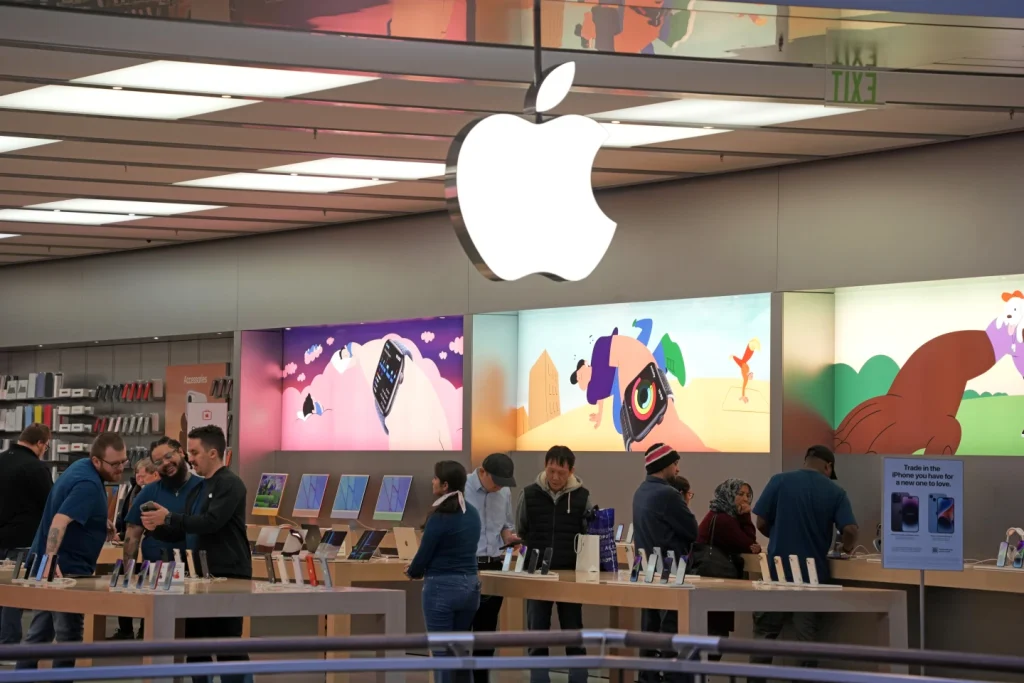Apple, the renowned technology trendsetter, experienced a continuous decline in sales throughout the summer season, leading to a full year of decreasing revenue.
This is a significant departure from the company’s long-standing tradition of consistent growth, which had propelled it to become the most valuable publicly traded company worldwide.
The recently announced slight decline in sales for the July-September period marked the conclusion of Apple’s fiscal year, during which the company witnessed a decrease in revenue compared to the previous year in each quarter.
Although the revenue for the past fiscal year only dropped by 3% compared to the previous year, it is still a noteworthy anomaly for a business that has achieved such remarkable success.
In fact, earlier this year, Apple became the first U.S. company to reach a valuation of $3 trillion, underscoring its extraordinary achievements in the industry.
Apple has recently experienced a significant development in its financial performance, as it witnessed a drop in its fiscal year revenue for the first time since 2019.
This notable occurrence comes on the heels of a previous decline in sales back in 2019, when the company experienced a 2% decrease in revenue.
This recent downturn in Apple’s financial standing has undoubtedly caught the attention of industry analysts and investors alike, as it marks a departure from the company’s consistent growth over the past few years.
The implications of this decline raise important questions about the factors contributing to Apple’s revenue drop and the potential ramifications for the company’s future trajectory.
The latest financial results of Apple have garnered significant attention and analysis, as the tech giant experienced a minor decline in revenue but a notable increase in profit.
In the most recent quarter, Apple’s revenue decreased by 1% compared to the previous year, amounting to $89.5 billion.
However, the company’s profit rose by 11% to reach an impressive $22.96 billion, translating to $1.46 per share.
These figures not only surpassed market expectations but also demonstrated Apple’s ability to navigate a challenging economic landscape.
During a conference call with analysts, Apple CEO Tim Cook acknowledged the uncertain macroeconomic environment that the company continues to face.
This statement reflects the reality that global economic conditions can have a significant impact on the performance of even the most successful corporations.
Apple’s ability to maintain profitability in such circumstances is a testament to its resilience and strategic decision-making.
Despite the positive financial results, Apple’s stock price experienced a 3% decline in extended trading following the announcement.
This decline is part of a broader trend that has seen Apple’s shares fall by nearly 10% from their all-time highs reached in July.
However, it is important to note that even with this decline, Apple’s stock is still up by more than 30% for the year, indicating the overall strength and market confidence in the company.
One of the key factors contributing to the recent erosion in Apple’s stock price is concerns over a sales slowdown, particularly in China.
In the most recent quarter, Apple’s revenue in China experienced a decline of 2% compared to the same period last year.

Analysts had anticipated stronger performance in this region, and the lower-than-expected revenue has led to apprehension among investors.
Adding to these concerns is the possibility that China may restrict purchases of iPhones by government workers amid escalating tensions with the United States.
This potential development coincides with the launch of new smartphones by Chinese tech giant Huawei, which poses a more formidable competition for Apple in the Chinese market.
These factors have contributed to the apprehension and caution observed among investors, leading to the recent decline in Apple’s stock price.
While the decline in revenue in China and the subsequent impact on Apple’s stock price are noteworthy, it is crucial to view these developments within the broader context.
Apple’s overall financial performance remains strong, with the company still reporting significant profit growth.
Furthermore, the decline in revenue from China should be seen as a temporary setback rather than a long-term trend, as Apple continues to innovate and adapt to the evolving market dynamics.
In conclusion, Apple’s latest financial results reveal a mixed performance, with a slight decline in revenue but a notable increase in profit.
The company’s ability to navigate an uncertain macroeconomic environment and maintain profitability is commendable.
However, concerns over a sales slowdown in China and potential restrictions on iPhone purchases have led to a decline in Apple’s stock price.
Nevertheless, Apple’s overall financial strength and market confidence remain intact, positioning the company to overcome these challenges and continue its impressive growth trajectory.
During a conference call held on Thursday, Cook, the CEO of Apple, made an insightful observation regarding the company’s performance in the Chinese market.
Despite Apple’s growing market share in China, the sluggish economy of the country has led to a reduction in consumer spending.
Cook expressed his unwavering optimism about China, highlighting its significance as a key market for Apple.
The decline in Apple’s overall revenue can be primarily attributed to consumers holding onto their iPhones for longer periods, as the latest models offer only incremental improvements.
Additionally, the persistently high inflation rates continue to exert pressure on household budgets, further impacting consumer spending patterns.
Consequently, industry analysts, such as Jesse Cohen from Investing.com, are pondering whether this decline is merely a temporary setback or indicative of a larger shift in consumer behavior.
Rising interest rates and a weakened economic backdrop have deterred consumers from making expensive purchases, raising concerns about the sustainability of Apple’s revenue growth.
In an effort to boost revenue, Apple has resorted to increasing prices. For instance, the starting price of the iPhone 15 Pro Max, the company’s flagship device unveiled in September, saw a $100 hike to reach $1,200 compared to the previous year’s version.
Moreover, Apple recently raised prices for various subscription products, including its video streaming service, which saw a substantial 43% increase in its monthly fee, now standing at $10 per month.
In a positive development, Apple experienced a 3% increase in iPhone sales, amounting to an impressive $43.8 billion in revenue.
This rise indicates that the company’s latest iPhone models have been well-received by consumers, which bodes well as the holiday shopping season approaches.
Additionally, Apple’s service division also performed exceptionally well, generating a robust quarterly revenue of $22.31 billion, marking a notable 16% increase compared to the previous year.
A significant portion of this revenue is derived from Apple’s partnership with Google. Google pays Apple to ensure that its search engine remains the default option for responding to queries made on iPhones and the Safari browser.
However, this arrangement has become the focal point of an ongoing antitrust trial, which questions whether this alliance between two technology giants stifles competition and innovation in the industry.
During the trial, evidence has emerged revealing that Google paid Apple and other companies more than $26 billion in 2021 to secure its search engine’s privileged position.
Industry analysts now estimate that Apple receives an average of $4 billion to $5 billion quarterly from Google. However, if the judge presiding over the trial rules that these payments are anticompetitive, this steady stream of revenue could potentially evaporate.
When questioned about the nature of their agreements with Google during a conference call, Apple CEO Tim Cook emphasized the importance of making decisions that serve the best interests of their users.
This response suggests that Apple considers these arrangements with Google as significant and aims to prioritize the needs and satisfaction of their user base.
The recent news regarding Apple’s financial performance is certainly noteworthy. Despite the challenges posed by the ongoing pandemic, the company has managed to achieve a 3% increase in iPhone sales, amounting to a staggering $43.8 billion.
This is a promising sign that Apple’s latest models have been well-received by consumers, particularly as we approach the holiday shopping season.
In addition to the positive sales figures, Apple’s service division has also experienced significant growth, reporting a 16% increase in revenue from the previous year, reaching $22.31 billion.
This division plays a crucial role in Apple’s overall business strategy, as it provides a diverse range of services to complement their hardware offerings, including Apple Music, iCloud, and the App Store.
One particularly interesting aspect of Apple’s service division success is the revenue generated from their partnership with Google.
As part of an agreement, Google pays Apple to have its search engine set as the default option on the iPhone and Safari browser.
This arrangement has come under scrutiny during an ongoing antitrust trial, which questions whether this alliance between two tech giants hampers competition and innovation in the market.
The trial has revealed that Google paid a substantial amount, exceeding $26 billion, to Apple and other companies to secure its search engine’s privileged position in 2021.
Analysts now estimate that Apple receives an average of $4 billion to $5 billion per quarter from Google, making it a significant source of revenue. However, if the judge rules that these payments are anticompetitive, this revenue stream could potentially be jeopardized.
When questioned about the agreements with Google during a conference call, Apple CEO Tim Cook emphasized the importance of making decisions that are in the best interest of their users.
While Cook did not delve into the specifics, it is clear that Apple values the partnership with Google and views it as beneficial for their users.

The outcome of the antitrust trial will undoubtedly have far-reaching implications for both Apple and Google, as well as the broader tech industry.
It will not only determine the future of their partnership but could also set a precedent for similar agreements between tech companies.
The trial raises important questions about competition, innovation, and the balance of power within the industry.
As Apple continues to navigate these challenges, it is evident that the company remains focused on delivering value to its customers.
The positive sales figures and robust performance of their service division demonstrate Apple’s ability to adapt and thrive in a highly competitive market.
It will be interesting to see how the antitrust trial unfolds and the impact it may have on the tech landscape moving forward.
